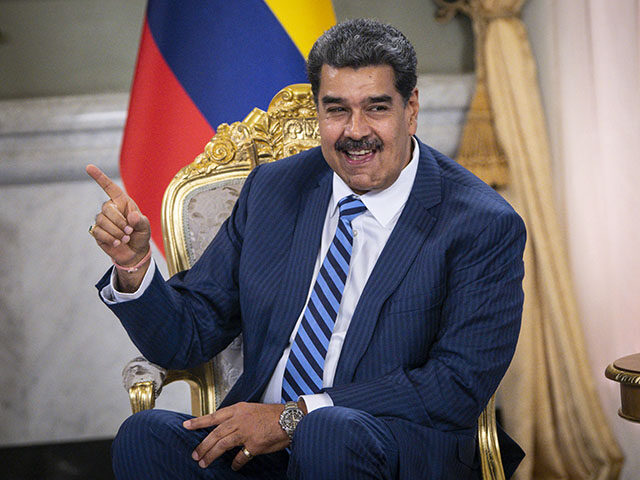CARACAS, Venezuela — The administration of American President Joe Biden is holding talks with socialist dictator Nicolás Maduro that could lead to a temporary lifting of oil sanctions in exchange for “free and fair elections” in Venezuela, according to reports published by Bloomberg and Reuters on Wednesday.
The Maduro regime is expected to hold a sham presidential election in 2024. Nicolás Maduro, first elected in 2013 in a heavily contested election, has clung to power since 2018 through the results of a sham election where only handpicked rivals were able to participate. Maduro is poised to seek “reelection” for a second six-year term in the new sham voting cycle, as the ruling United Socialist Party of Venezuela (PSUV) amended the constitution in 2009 to remove all public office term limits.
Although the election is expected to take place in 2024, Maduro, as well as PSUV vice president and alleged drug lord Diosdado Cabello, have repeatedly suggested this year that the presidential election could take place sooner, sometime in 2023. This week, Cabello asserted that the regime may hold the event as soon as September.
Since December, Maduro and other high-ranking regime officials have repeatedly insisted that there will be no “free and fair” elections in Venezuela until the United States, the European Union, Canada, and other countries first lift all sanctions, a demand they have rhetorically branded “sanctions-free fair elections.”
Maduro claimed last year that the sanctions relief provided by the Biden administration was not “enough.”
“Should Venezuela take concrete actions toward restoring democracy, leading to free and fair elections, we are prepared to provide corresponding sanctions relief,” White House National Security Council Spokesperson Adrienne Watson told Bloomberg.
According to Bloomberg, which cited anonymous “sources familiar” with the topic, the Biden administration has suggested temporarily lifting some or all of the sanctions imposed by the United States on the state-owned Petróleos de Venezuela (PDVSA) oil company in 2019 during the administration of former President Donald Trump.
In exchange, the Maduro regime would have to hold “free and fair” presidential elections in 2024 and release its political prisoners.
The Biden administration has already eased oil sanctions on the Maduro regime. In November, the White House granted a license to California-based Chevron that allows the company to produce and export oil from Venezuela.
As a result, Venezuela went from being 13th in oil-exporting countries to the United States in January to the sixth top oil supplier by May.
Venezuelan oil exports have surged in 2023 largely thanks to Biden’s sanctions relief, reaching a “stable” level of 877,032 barrels per day (bpd) not seen before the imposition of secondary oil sanctions on PDVSA in 2020 as of July.
Reuters, which cited five unnamed sources allegedly with “knowledge” of the negotiations, reported that the White House proposal would require the Biden administration to either amend executive orders issued by Trump in 2019 or issue new ones to undo the sanctions.
The changes would reportedly allow Europe and other regions to import Venezuelan oil in a “structured, organized way.” The sanctions relief would maintain trade restrictions on Venezuelan oil deals with China, Iran, Russia, and other countries, as these are under separate sanctions. Nonetheless, China has been reportedly aiding Venezuela in evading oil sanctions since 2020.
According to Reuters, the head of Venezuela’s opposition-led National Assembly Dinorah Figuera, who lives in exile in Spain, rejected an early draft of the proposal in July. The opposition-led National Assembly, elected in 2015, is the last democratically elected institution in Venezuela and was ousted by the Maduro regime in a sham election in late 2020. Maduro replaced the lawmakers with a new body overwhelmingly filled with PSUV deputies, as well as those of regime-allied parties and hijacked “opposition” parties.
Figuera reportedly rejected the draft proposal due to a lack of concrete steps the Maduro regime would have to take to organize “free and fair” elections.
None of the parties that have agreed to the upcoming presidential election have ensured the existence of any guarantees to ensure that all candidates are allowed to participate freely and all votes will be counted.
The Maduro regime is currently undergoing a process to refresh the board of the National Electoral Center (CNE), Venezuela’s top electoral authority, which is currently under the complete control of the ruling socialist party. The regime-controlled legislative National Assembly is tasked with the process of choosing the country’s new electoral authorities. A tentative list of CNE’s new directors is expected to be published at the end of August.
Venezuela’s “Unitary Platform,” which groups all of the country’s establishment “opposition” parties, is presently undergoing self-organized proceedings towards holding a primary election in October to choose a candidate to run against Maduro and other independent “opposition” candidates in the upcoming sham presidential election.
Recent polls indicate that former lawmaker María Corina Machado has an ample lead over the rest of the “opposition” primary candidates and is poised to be Maduro’s main rival. The Maduro regime retroactively imposed a 15-year ban on Machado this year that would presently prevent her from running in the upcoming election.
Christian K. Caruzo is a Venezuelan writer and documents life under socialism. You can follow him on Twitter here.

COMMENTS
Please let us know if you're having issues with commenting.